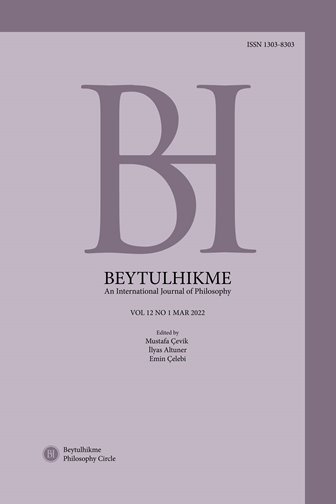Author :
Abstract
Platon düşüncesinde mitos-logos gerginliğinin açıktan hissedildiği diyalogların başında Devlet diyaloğu gelir. Platon, felsefi argümanını mitoslara karşı güçlendirmek adına onları kimi zaman değiştirerek kimi zaman da yeni baştan ele alarak kullanır. Gyges de adalet tartışması temelinde aktarılan mitlerden biridir. Sokrates’in adalet tartışmasında söylediklerini yeterli görmeyen Glaukon, Thrasymakhos’un bıraktığı yerden tartışmayı devralır. Adaletin, adaletsizliğe uğrama korkusundan başka bir şey olmadığını düşünen Glaukon kimsenin sırf kendisi için adaleti istemeyeceğini düşünür. Bu argümanını Gyges miti ile açıklar. Gyges adına Devlet diyaloğundan önce başka kaynaklarda da rastlanır. Bunlardan en ünlüsü Herodotos’un Tarih kitabının ilk cildinde yer alır. Her iki anlatı arasındaki benzerlikler Platon’un bu metinden haberdar olduğunu düşündürür. Glaukon’un Gyges hikayesi, yer yarığı içerisinde tesadüfen bir yüzük bulan çobanın yüzüğün görünmezlik özelliğini kullanarak kral olmasını anlatan bir mittir. Çoban görünmezlik yüzüğü ile kralı öldürür, kraliçe ile evlenir ve kral olur. Dolayısıyla Glaukon için adalet bir çeşit korku ile gerçekleştirilen eylemdir. Sokrates tüm diyalog boyunca Glaukon’un aktardığı bu mite kimi zaman felsefi argümanlarla kimi zaman da başka mitlerle karşı çıkar. Denilebilir ki ideal site ve ideal sitenin yöneticisi filozof kral Gyges’in karşı kutbunda oluşturulmuştur. Bu manada Gyges sadece adalet için anlatılan bir mit değil ideal polis inşası için de temel bir anlatıdır.
Keywords
Abstract
The Republic is one of the dialogues in which mythos-logos tension is felt in the idea of Plato. Plato uses his philosophical arguments to strengthen them against mythos, sometimes changing them and sometimes reconsidering them. Gyges is also one of the myths expressed based on the discussion of justice. Glaucon, who did not see enough of what Socrates said in the debate on justice, takes over the discussion where Thrasymakhos left off. Glaucon, who thinks justice is nothing but fear of injustice, believes that no one will want justice just for himself. That would explain his argument with the Gyges myth. Gyges is also found in other sources before the Republic dialogue. The most famous of these is in the first volume of Herodotos' History. The similarities between the two narratives suggest that Plato is aware of this text. Glaucon's Gyges story is a myth about the shepherd who stumbled upon a ring inside the ground crevice and became king using the invisibility of the ring. The shepherd kills the king with the invisibility ring, marries the queen and becomes king. So for Glaucon, justice is an act of fear. Socrates opposes this myth expressed by Glaucon throughout the entire dialogue, sometimes with philosophical arguments and sometimes with other myths. It is said that the ideal site and philosopher-king are opposite the Gyges. In this sense, Gyges is a myth for justice and a basic narrative for the perfect polis construction.
Keywords
- Adluri V. & Lenz, J. (2013). From Politics to Salvation through Philosophy: Herodotus’
- Allen, D. S. (2011). Platon Neden Yazdı? (Çev.: Ayşe Lucie Batur). İstanbul: İletişim Yayınları.
- Armstrong K. (2005). Mitlerin Kısa Tarihi. (Çev.: Dilek Şendil). İstanbul: Merkez Kitaplar.
- Deleuze, G. (2015). Anlamın Mantığı(Çev.: Orçun Türkay). İstanbul: Norgunk Ya- yıncılık.
- Demir, M. (2010). Gyges’in Sadyattes’i Tahttan İndirme Hikâyesi: Yeni Bir Göz- den Geçirme, Colloquium Anatolicum, Sayı: IX., Ss.: 229-268.
- Danzig, G. (2008). Rhetoric and the Ring: Herodotus and Plato on the Story of Gyges as a Politically Expendient Tale, Greece & Rome, Second Series, Vol. 55, No. 2, pp. 169-192.
- Davis, M. (2000). The Tragedy of Law: Gyges in Herodotus and Plato, The Review of Metaphysics, Mar., 2000, Vol. 53, No. 3, pp. 635-655.
- Herodotos. (2012). Tarih (Çev.: Müntekim Ökmen). İstanbul: İş Bankası Kültür
- Koyre, A. (2020). Platon Okumaya Giriş-Descartes Üzerine Konuşmalar (Çev.: Kurtuluş Dinçer). Ankara: Pharmakon Kitap.
- Ksenophon. (1994). Sokrates’ten Anılar (Çev.: Candan Şentuna). Ankara: Türk Tarih Kurumu.
- Laertios, D. (2013). Ünlü Filozofların Yaşamları ve Öğretileri (Çev.: Candan Şentuna). İstanbul:Yapı Kredi Yayınları.
- Laird, A. (2001). Ringing the Changes on Gyges: Philosophy and the Formation of Fiction in Plato's Republic, The Journal of Hellenic Studies, Vol. 121 (2001), pp. 12-29.
- Nichols, M. (1984). P. Glaucon's Adaptation of the Story of Gyges & Its Implica- tions for Plato's Political Teaching, Polity, Autumn, Vol. 17, No. 1, pp. 30-39.
- Platon. (2011) Küçük Hippias (Çev. Furkan Akderin). İstanbul: Say Yayınları.
- Platon. (1989). Protagoras (Çev.: N. Şazi Kösemihal). İstanbul: MEB Yayınları.
- Plutrark. (1962). Plutarkh’s Moralia (Translation: Frank Cole Babbitt). Cambridge: The Loeb Classic Library, V.4, Harvard University Press.
- Rosen, S. (2005). Plato’s Republic, A Study, New Haven & London: Yale University Press.
- Strauss, L. (2019). Platon’un Politik Felsefesi: Devlet (Çev.: Özgüç Orhan). İstanbul: Pinhan Yayıncılık.
